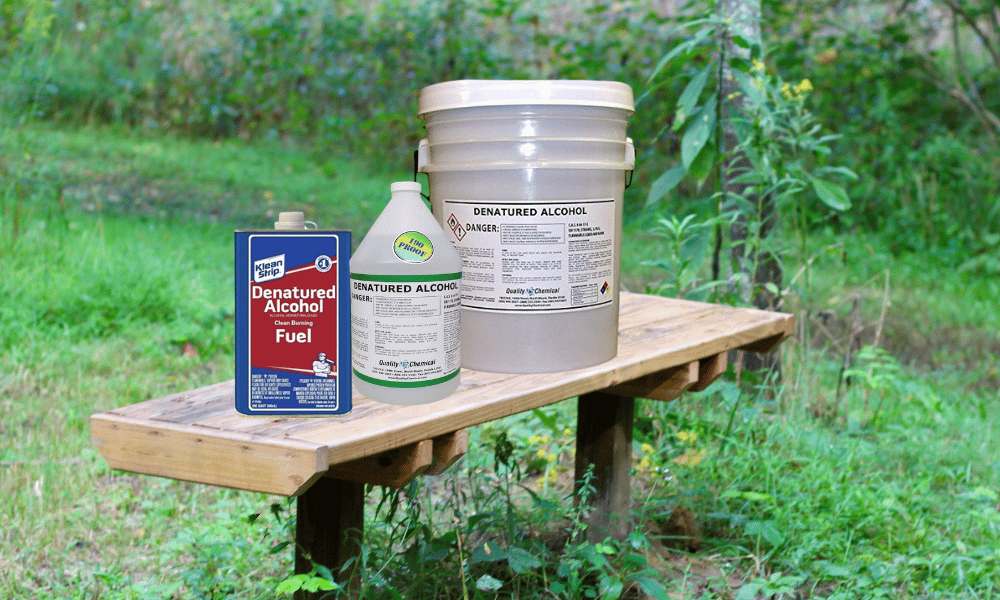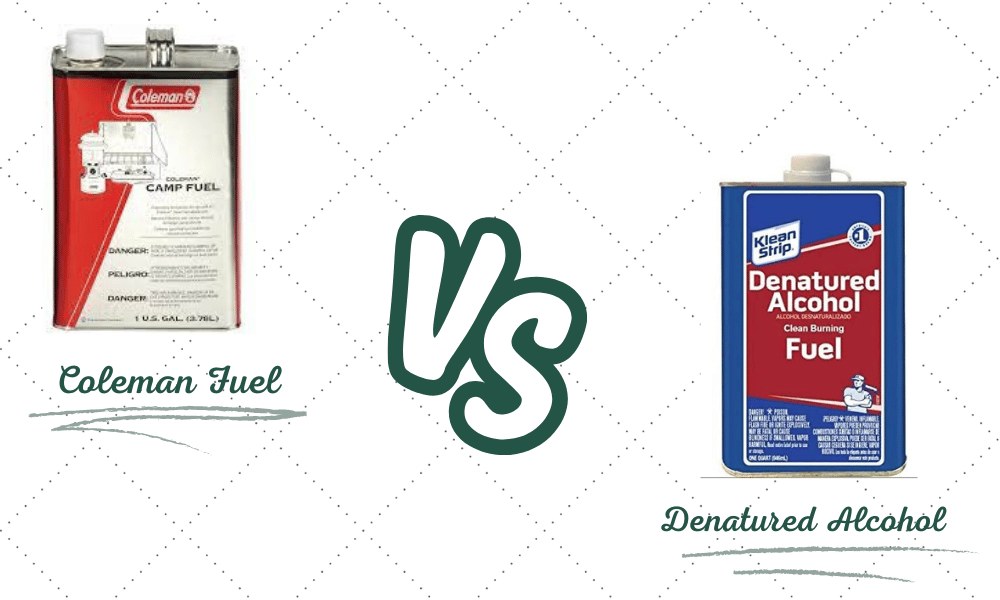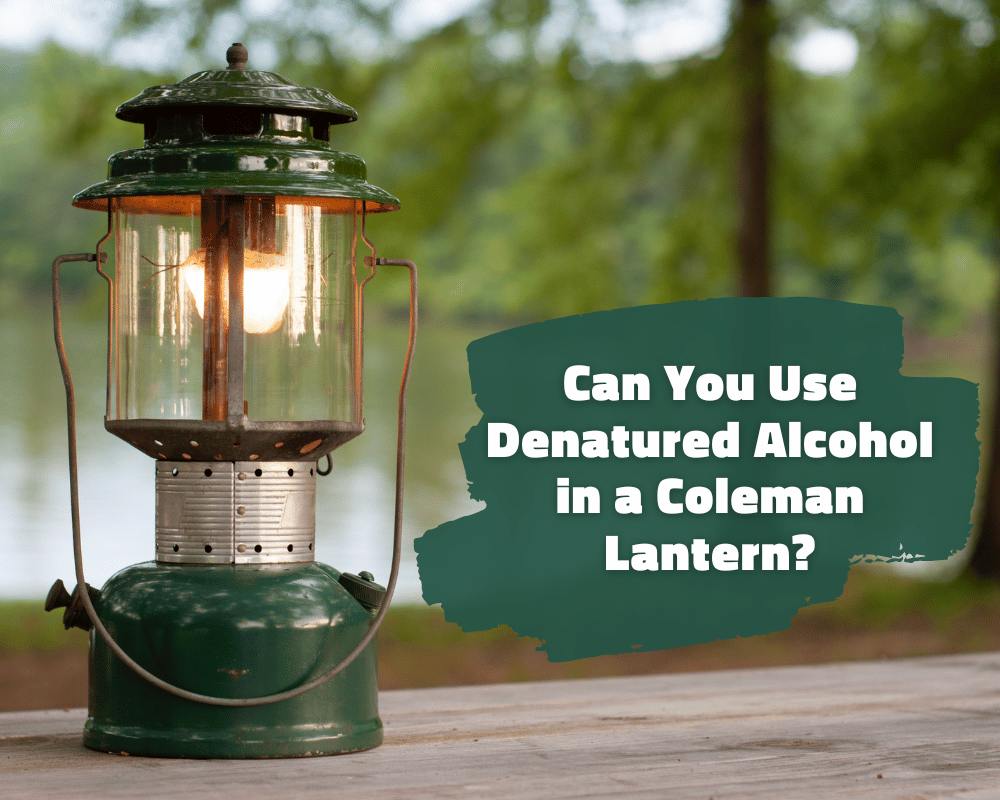When it comes to camping gear, one of the most important pieces of equipment is a reliable light source. Coleman lanterns are often the go-to choice for bushcrafters—they provide bright light over a large area and are known for their durability, reliability, and ease of use.
Given the rise in use of denatured alcohol as a camping fuel, many campers are wondering if it is possible to use denatured alcohol in a Coleman lantern. In this article, we’ll answer that question for you and explain the various reasons behind the answer.
What Is Denatured Alcohol?
Denatured alcohol, also known as methylated spirits, is a type of fuel commonly used in camping stoves, portable heaters, and other outdoor equipment. It is made from a mixture of methanol, benzene, pyridine, castor oil, gasoline, isopropyl alcohol, and acetone. It’s considered undrinkable and is therefore tax free, making it a cheaper alternative to other fuels popular in the outdoor community, like propane and butane.

Denatured alcohol also stands out for being a cleaner burning fuel than white fuel and kerosene; it doesn’t produce as many harmful pollutants, soot, and smoke, making it more environmentally friendly than some alternatives. However, denatured alcohol does produce carbon dioxide and, for that reason, should only be used in well-ventilated areas. Can you use denatured alcohol in a Coleman lantern? Let’s get on to the answer next!
Denatured Alcohol and Coleman Lanterns
In theory, it is possible to use denatured alcohol in a Coleman lantern, but it is not recommended. Coleman lanterns are designed to be used with Coleman fuel or unleaded gasoline—not denatured alcohol.
What Is Special About Coleman Fuel Compared to Denatured Alcohol?
Coleman fuel is a unique blend of chemicals that include cyclohexane, nonane, octane, heptane, and pentane. It’s formulated to provide a consistent, stable flame and to burn cleanly. The fuel is designed to work in harmony with a Coleman lantern’s combustion chamber and burner, providing a steady, reliable light source. Using denatured alcohol in a Coleman lantern can disrupt this balance and cause the lantern to produce an uneven or unstable flame.

Another important difference is that denatured alcohol is a liquid fuel, whereas Coleman fuel is pressurized. This means that denatured alcohol cannot be pumped into a Coleman lantern as easily. This can cause issues with the lantern’s functionality. Many Coleman lanterns have a filler cap and spout designed to work specifically with Coleman fuel. Using denatured alcohol with this system may cause leaks or spills, which can be dangerous. You can, admittedly, modify your lantern to make it more compatible with denatured alcohol—but as you’ll learn in the next section, doing that isn’t recommended.
Why You Shouldn’t Modify Your Lantern for Denatured Alcohol
Given that denatured alcohol isn’t quite compatible with Coleman lanterns, you would do best to make modifications to the lantern—but this can also be a dangerous task. For instance, you would have to replace the fuel tank and the wick and add a pressurized system to pump the fuel. Such modifications can damage your lantern as well as being dangerous.
Furthermore, using denatured alcohol—and/or modifying your Coleman lantern—may void the manufacturer’s warranty. This means that if any damage arises from denatured alcohol or modifications, the manufacturer will not repair or replace your lantern. You can check the instructions manual of your Coleman lantern to see which fuels are compatible and approved.

Further Disadvantages of Denatured Alcohol in Coleman Lanterns
Finally, if that all weren’t enough to make you think twice about using denatured alcohol, here a few final disadvantages it brings:
- Denatured alcohol can corrode the metal parts of a Coleman lantern, making it less and less durable (and useful) over time.
- Since denatured alcohol doesn’t burn as hot or for as long as Coleman fuel, the light given off in your lantern will be weaker and burn out faster. That is less than ideal in bushcraft situations where performance is key. If the lantern goes out, it may require you to create a fire in the wilderness as an alternative.
Summary
While it is, technically, possible to use denatured alcohol in a Coleman lantern, it is not recommended. Coleman lanterns are designed to be used with Coleman fuel or unleaded gasoline only. Using denatured alcohol can be dangerous, cause damage to the lantern, or even start a fire. It can also affect the performance and longevity of your lantern.
As you’ve learned, it’s also best to stick with the recommended fuel type for your manufacturer’s warranty. If in doubt, follow this rule: play it safe and stick with the approved fuels for your camping gear!
I am Bruno. Navigating the urban rush by day, I find peace under the stars by night. Alongside my loyal companion and co-adventurer Lilith, we explore the balance between city life and nature’s embrace. Through writing and films, I delve into bushcraft and the wild’s allure.
GointheWilderness is my bridge between these two realms, guiding you to reconnect with your innate wilderness.
Eden is here and now; join us in rediscovering it.

